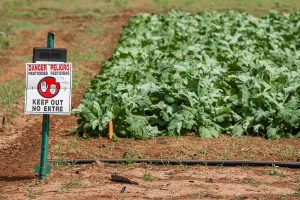Pesticides or Ecocide: The Effects of Agricultural Pesticides on Human and Wildlife Health
By: Alyssa Cassini, Michelle Hazlett, and Gabby Kase
America’s current social institutions force the nation’s citizens to be extremely dependent on the agricultural industry. Our resource-based culture has required farmers to produce billions of pounds of food and other resources each year, much of which goes to waste. To keep up with the demand and help ensure they produce the most goods with the smallest amount of input possible, farmers turn to various pesticides and other chemicals. While chemicals do prevent pests and and diseases from harming plants and livestock, they also are absorbed into the product or run-off into our water supply. In the latter half of the 20th century, research has shown the detrimental health effects these chemicals have on humans and other animals. These health concerns disproportionately affect certain demographics such as lower class and minority communities due to a lack of access to and ability to afford pesticide free foods. The use of agricultural pesticides and other chemicals is an enormous public and environmental health issue that requires immediate systematic and industrial change. In order to prevent more health concerns, our society as a whole must learn to adopt a more ecocentric view and work with nature instead of manipulating it.
Keywords:
Table of Contents:
Dependency on the Agriculture Industry
Bibliography
Aktar, Wasim, et al. “Impact of Pesticides Use in Agriculture: Their Benefits and Hazards.” Interdisciplinary Toxicology, vol. 2, no. 1, 2009, pp. 1–12., doi:10.2478/v10102-009-0001-7.
Alavanja, Michael C.R., et al. “Health Effects of Chronic Pesticide Exposure: Cancer and Neurotoxicity.” Annual Review of Public Health, vol. 25, 2004, pp. 155-197., doi: 10.1146/annurev.publhealth.25.101802.123020
Arnould, Eric J. and Thompson, Craig J. Consumer Culture Theory (CCT): Twenty Years of Research. Journal of Consumer Research, vol. 31, no. 4, 2005, pp. 868–882. doi: 10.1086/426626
Brulle, Robert J., and David N. Pellow. “ENVIRONMENTAL JUSTICE: Human Health and Environmental Inequalities.” Annual Review of Public Health, vol. 27, no. 1, 2006, pp. 103-124., doi:10.1146/annurev.publhealth.27.021405.102124.
Damalas, Christos A. and Eleftherohorinos, Ilias G. “Pesticide Exposure, Safety Issues, and Risk Assessment Indicators”. Int. J. Environ. Res. Public Health, vol. 8, no. 5, 2011, pp. 1402-1419. doi: 10.3390/ijerph8051402
Farrell, James J. “The Nature of College: How a New Understanding of Campus Life Can Change the World.” Milkweed, 2010, pp. 3-11.
Holifield, Ryan. “Defining Environmental Justice And Environmental Racism.” Urban Geography, vol. 22, no. 1, 2001, pp. 78-90., doi:10.2747/0272-3638.22.1.78.
Horrigan, Leo, et al. “How sustainable agriculture can address the environmental and human health harms of industrial agriculture.” Environmental Health Perspectives, vol. 10, no. 5, 2002, pp. 445-456. doi:10.1289/ehp.02110445
Kendall, R. J., & Smith P. N. “Wildlife Toxicology Revisited.” Environmental Science & Technology, 2003, pp. 179a-183a., doi:10.1021/es0324555
Landrigan, P J, et al. “Pesticides and Inner-City Children: Exposures, Risks, and Prevention.” Environmental Health Perspectives, vol. 107, no. suppl 3, 1999, pp. 431-437., doi:10.1289/ehp.99107s3431.
Malekirad, Ali A., et al. “Neurocognitive, mental health, and glucose disorders in farmers exposed to organophosphorus pesticides” Arh Hig Rada Toksikol. 2013. 64:1-8
Matson, P. A. “Agricultural Intensification and Ecosystem Properties.” Science, vol. 277, no. 5325, 1997, pp. 504-509., doi:10.1126/science.277.5325.504.
McGee, Julius. “Does Certified Organic Farming Reduce Greenhouse Gas Emissions from Agricultural Production?” Agriculture & Human Values, vol. 32, no. 2, June 2015, pp. 255–263. EBSCOhost, doi:10.1007/s10460-014-9543-1.
Shriver, Adam J., et al. “Environmental Neuroethics: Bridging Environmental Ethics and Mental Health.” The American Journal of Bioethics, vol. 17, no. 9, 2017, pp. 26–27., doi:10.1080/15265161.2017.1353172.
Thompson, Paul B. “The Reshaping of Conventional Farming: A North American Perspective.” Journal of Agricultural and Environmental Ethics, vol. 14, no. 2, 2001, pp. 217-229. doi: 10.1023/A:1011388424793
Wolford, Wendy. “Environmental Justice and the Construction of Scale in Brazilian Agriculture.” Society & Natural Resources, vol. 21, no. 7, 2008, pp. 641-655., doi:10.1080/08941920802096432.
